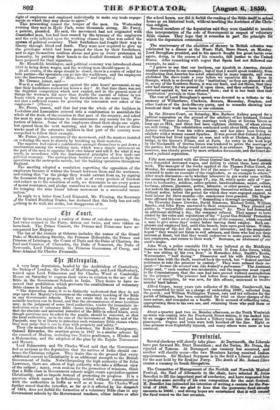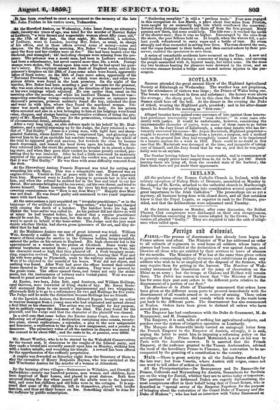Vruniurinl.
Several elections will shortly take place. At Dartmouth, the Liberals have put forward Mr. Sturt Donaldson ; and the Tories, Mr. Dunn, the rejected of 'Totness. At Devonport one vacancy has occurred, and another will shortly occur—the two Members having received Indian appointments. Sir Michael Seymour is in the field a Liberal candidate for the seat held by Sir Erskine Perry. The death of Mr. Robert Clive creates a vacancy an South Shropshire.
The Committee of Management of the Norfolk and Norwich Musical Festival, the Earl of Albemarle in the chair, have selected M. Jules Benedict to fill the important post of conductor, and have requested him to produce some novelty of his own composition for the next festival. M. Benedict has intimated his intention of writing a cantata for the Fes- tival of 1860. We are glad to hear that the guarantee fund already amounts to 3000/. ; and strong hopes are entertained that it will exceed the fund raised on the last occasion. It has been resolved to erect a monument to the memory of the late Mr. John Fielden in his native town, Todmorden.
At the Hereford Assizes, on Wednesday, John Isaac Jones, an attorney's clerk, twenty-six years of age, was tried for the murder of Harriet Baker at Ledbury, " a very decent and respectable woman about fifty years old," on the 17th of May last. On that night, Mr. Masefield, a solicitor, of Ledbury, went to London, leaving Mrs. Baker, as usual, in charge of his offices, and in those offices several sums of money—notes and cheques. On the following morning, Mrs. Baker "was found lying dead upon the floor and her clothes were on fire." She had been beaten over the forehead, and strangled ; 44/. including cheques were missing from the pre- mises. The prisoner was a needy man, had been in Ledbury workhouse, had been a schoolmaster, but never earned more than 18s. a week. Postage stamps were stolen, 641. found upon him soon after he had spent his quar- ter's salary. His employer missed two Bank of England notes, and in the prisoner's fireplace on the 28th of June some ashes were found, apparently ashes of Bank notes ; on the 30th of June more ashes, apparently of the "National Provincial Bank," two of which were stolen ; and other sus- picious debris were found in the back premises. On the night of the murder, Mrs. Baker had been mending a pair of trousers for the prisoner, who was seen about ten o'clock going in the direction of his master's house, or his own lodgings which adjoined. He rose earlier than usual on the morning after the murder, and while his landlord Thomas Bowcott was— suspecting something wrong—eudeavouring to procure an entrance into deceased's premises., prisoner suddenly found the key, unlocked the door and went in with him, where they found the murdered woman. Pri- soner was much agitated after he had seen the body. On his person when arrested and also in a box belonging to him at his lodgings were found coins, cheques, and stamps bearing corroborative evidence of being the pro- perty of Mr. Masefield. The case for the prosecution, voluminous and full of circumstantial detail, established.
After a very long trial, an able defence made in his behalf by Mr. Hud- dlestone, and a careful summing up by the Judge, the Jury returned a ver- dict of " Not Guilty." Jones is a young man, with light hair and sharp- pointed features, whose knitted brows, compressed lips, and glancing eyes showed him to be of an excitable but resolute temper. During the whole of the trial he appeared pale and anxious, but towards the close he became much depressed, and leaned his head down upon his hands. When the Jury returned into the court the prisoner was brought in in almost a faint- ing state, and when they gave their verdict he became greatly excited, pro- testing that he was innocent. After he had a little recovered he anxiously inquired of the governor of the gaol what the verdict was, and was assured that it was "Not Guilty." He was then with some difficulty removed from the dock.
At the Shrewsbury Assizes Francis Hopwood was tried for cutting and wounding his wife Mary. This was a remarkable case. Hopwood was an engine-driver. Unable to live at peace with his wife she had separated from him. Hopwood went to Ludlow hoping to persuade her to live with him, and when she refused he stabbed her in the face and tried to cut her throat. Her screams bringing aid he ran away, cut his own throat, and tried to drown himself. Taken insensibe from the river his first question on re- covering consciousness was "How is my dear Mary ?" Happily dear Mary was not dead. He was found guilty and sentenced to two years' imprison- ment with hard labour.
At the same assizes a jury acquitted an " irregular practitioner," or in the language of the midland counties a " bone-setter," who had been charged with causing the death of a butcher. The butcher broke his leg, and Dickin the bone-setter was called in. As his patient did not thrive so well as many he had treated before, he desired that aregular practitioner should be sent for. This was done, but the man died. His sons came for- ward to speak in behalf of the bone-setter. The Judge said the jury must decide whether Dickin had shown gross ignorance of the art, and they de- cided that he had not.
At the Maidstone Assizes one ease of great interest was tried. William Weir, formerly a soldier in the 95th Regiment, a good soldier and the wearer of three clasps for service in the Crimean battles, being invalided, entered the police on his return to England. His high character led to his appointment as a warder in the prison at Chatham. Some weeks ago several burglaries occurred there ; inquiry threw suspicions on Weir, but his character stood so high that they glanced off. A fresh burglary occur- ring, suspicion revived. The police superintendent, hearing that Weir and his wife were going to Plymouth, went to the railway station and asked Weir if he objected to the search) of his boxes. Weir did not object, and nothing was found. After Weir had gone the officer learned that certain boxes directed to Weir were still at the station. They were to proceed by the goods train. The officer opened them, and found not only the stolen goods, but the instruments of robbery and a loaded pistol. Weir was sen- tenced to penal servitude for ten years.
At Exeter, two boys, John Bolt, aged fourteen, and William Hellings, aged thirteen, were convicted of firing stacks of hay. Mr. Baron Bram- well sentenced them to one month's imprisonment and two whippings ; afterwards Bolt is to go to a reformatory for two and Hellings for five years. The Judge said be made the distinction because Hellings has no friends.
At the Ipswich Assizes, the Reverend Edward Rogers brought an action to recover damages from a young man who had originated and spread abroad afoul libel on his character. The action was not brought for any purpose, but to publicly expose the falseness of the libeL The Jury found for the plaintiff, and the Judge said that the character of the plaintiff was cleared.. In a civil ease that came before the Exeter Assize Court, there were the following set of pleadings :—A declaration containing nine counts, twenty- five pleas, eleven replications, a rejoinder, a plea to the new assignment and demurrer, a replication to the plea to new assignment, and a joinder in demurrer. The pecuniary value of all the matters in dispute was stated by the counsel to be about 600/., and the costs to be, at present, over 20001.
Mr. Stuart Wortley, who is to be started by the Wakefield Conservatives for the vacant seat, is obnoxious to the roughs of the Liberal party, and made a brutal and cowardly assault upon him on Monday, striking him with a leaden missile' and wounding his temple. A reward has been offered for the apprehension of the ruffianly- perpetrator.
A respite was fowarded on Saturday. night from the Secretary of State to stay the execution of Henry Benjamin Haynes, who was convicted at the late Winchester Assizes for the murder of a woman at Aldershott.
By the burning of two villages—Buttermere in Wiltshire, and Crowell in Oxfordshire—nearly one hundred persons, men women and children, have been deprived of their home; and placed in great distress. Both fires occurred during the day when nearly all the adults were in the harvest- field, and none but children and old folks were in the cottages. It is sup- posed that some of the children, left to themselves, played with lucifer matches, and thus set their homes on fire. Something should be done for the sufferers by public subscription. " Gathering samphire " is still a "perilous trade." Four men engaged in this occupation on Lea Mandl, a place about four miles from Preston, were caught by an unusually high tide which overflowed the causeway. Several deep drainage channels cut them off from the firm ground. Many persons saw them, but none could help. The tide rose ; it reached the necks of the shorter men ; then it rose no higher. Encouraged by the cries from the shore, the poor fellows held on. At length, when the waters fell, a gal- lant youth volunteered to carry ropes and a bottle of rum. He swam strongly and thus succeeded in saving four lives. The rum cheered the men, and the ropes fastened to their bodies, and then carried ashore by their pre- server, enabled the spectators to save them.
A series of remarkable accidents have occurred on the Tyne. A new and half-finished chapel fell during a ceremony of laying a stone, and carrying the people assembled with it, injured many, but killed none. On the same day two brothers boating for pleasure were drowned in the river, and an excursion steamer fouled a bridge and caused serious injuries to the pas- sengers.



























 Previous page
Previous page